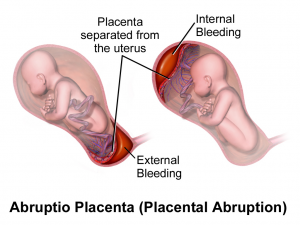Placental Abruption & Birth Injuries
The placenta is an organ within the uterus which holds the fetus while it is develops during pregnancy. It is responsible for ensuring nutrients and oxygen from the mother reach the developing baby. During a normal and uncomplicated pregnancy, the placenta remains attached to the uterine wall until the baby is delivered, and it separates naturally and exits the birth canal. On occasion, the placenta separates from the uterine wall before the baby is ready for delivery; this is called placental abruption and can occur at any time after 20 weeks gestation.

During a total placental abruption, there will be no oxygen delivered to the baby from the mother. If this occurs, it is essential for the baby to be delivered immediately; quite often through an emergency C-section. Even a partial placental abruption can become serious very fast, so it is important for the baby to be delivered immediately if the pregnancy is at or close to term. If it is too early for delivery to safely occur, the doctor will more than likely closely monitor both mother and baby and prepare the mother for the possibility of an emergency C-section if the baby becomes distressed or the abruption becomes worse.
If your doctor fails in his or her duty to identify or treat your placental abruption quickly, it can lead to a number of serious conditions for the child (including cerebral palsy).
Risk Factors for Placental Abruption
There are several factors that can place a woman at risk for placental abruption that include the following:
- History of placental abruption
- Hypertension
- Abdominal trauma
- Smoking or use of cocaine during pregnancy
- Damage to the amniotic sac such as leakage or breakage before the onset of labor
- Disorders in the blood clotting process
- Pregnancy involving multiple babies
- Age of the mother (more common in women past the age of 40)
Symptoms of Placental Abruption
It is more common for placental abruption to occur during the last trimester, and even more common during the last few weeks before the baby’s birth. The most common symptoms of placental abruption include:
- Vaginal bleeding
- Pain in the abdomen
- Pain in the back
- Tenderness of the uterus
- Contractions that occur in rapid succession, often simultaneously
In many cases, abdominal and back pain commence suddenly. There is no consistency in the amount of vaginal bleeding, and it has no bearing on the amount of abruption that has occurred. In some cases there may even be a severe placental abruption with minimal bleeding.
Placental abruption does not always occur quickly; sometimes it develops slowly. In addition, the baby may develop at a slower rate than normal and there may be low amniotic fluid or various other complications.
If your child developed cerebral palsy due to improper treatment of placental abruption, speak with our cerebral palsy attorneys by calling 1-855-833-3707 (toll-free). The call is free, the consultation is free, and they may be able to help you obtain the compensation you deserve to care for your child.
